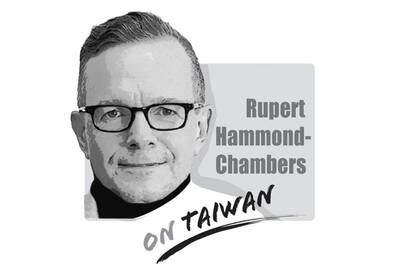US ‘has the goods’ on Ma
US Secretary of State Condoleezza Rice stated in an interview with the Wall Street Journal on June 19 that while “encouraging the Chinese and the Taiwanese to try to improve cross-strait relations,” she wanted to “remind everybody that the US has a relationship with Taiwan ... and that the US also wants to make sure that China understands that it’s not just provocative behavior on the part of Taiwan that the US opposes, but provocative behavior on the part of China.”
The “relationship,” which she pointedly brought to the attention of everybody, including undoubtedly President Ma Ying-jeou (馬英九) and Beijing’s leaders, could be interpreted as a degree of US sovereignty over Taiwan.
Washington prefers to leave the extent of the dominion ambiguous beyond what is defined in the Taiwan Relations Act, which not only outlines US responsibilities but also implies the US’ right to act on these responsibilities.
When she said that “some of the things that [former president] Chen Shui-bian (陳水扁) tended to do were just outright provocative ... the referendum was just provocative,” she was ostensibly referring to how he infuriated Beijing.
However, since Chen’s moves were undertaken to strengthen the Taiwanese people’s hold on Taiwan’s sovereignty and diminish the US’ share as a result, she might as well have been describing how the moves irritated Washington.
There is a consistency when following this second line of reasoning to clarify what could be deemed “provocative behavior on the part of China.”
While Washington never “opposes” China’s rhetorical claims about Taiwan, Taiwanese do. That means “behavior on the part of China” that is offensive to Washington, not just to the Taiwanese, could be construed as “provocative,” according to Rice.
Therefore, Rice’s use of the diplomatic lexicon represents a warning to both Ma and Beijing to steer clear of deals that could lead to yielding part or all of Taiwan’s sovereignty, in which Washington has a stake, to China.
This might seem like the first time in a while that Washington needed to remind people of its role in Taiwan. In reality, Washington has made use of that dominion to meddle in Taiwan’s internal politics whenever it saw fit.
It was only as recently as a few months ago that Washington rode shotgun to facilitate Ma’s presidency while simultaneously buying an insurance policy to guard against being crushed alongside him.
Ma’s green card drama unfolded in the final stretch of the presidential campaign. Then, subsequent to a series of meetings between Ma and US officials, all Taiwanese follow-up investigations, official or otherwise, hit a stone wall.
These days, Washington would disclose tidbits from the treasure trove of US green card and naturalization data pertaining to officials of the Ma administration as well as the KMT whenever the US surmises it is necessary to alert Ma that it still has the goods on him.
Washington hence has established a forceful means of persuading Ma to do its bidding other than words from Rice and company. Like other US foreign ventures, this move comes with collateral damage to the host country.
In the current case, Taiwan’s voters might have been bamboozled into electing someone at least morally, if not constitutionally, unfit for the presidency, thereby making a mockery of Taiwan’s democracy.
That would be a very steep and far-reaching price for the Taiwanese people to pay.
Huang Jei-hsuan
Los Angeles, California
Having lived through former British prime minister Boris Johnson’s tumultuous and scandal-ridden administration, the last place I had expected to come face-to-face with “Mr Brexit” was in a hotel ballroom in Taipei. Should I have been so surprised? Over the past few years, Taiwan has unfortunately become the destination of choice for washed-up Western politicians to turn up long after their political careers have ended, making grandiose speeches in exchange for extraordinarily large paychecks far exceeding the annual salary of all but the wealthiest of Taiwan’s business tycoons. Taiwan’s pursuit of bygone politicians with little to no influence in their home

In 2025, it is easy to believe that Taiwan has always played a central role in various assessments of global national interests. But that is a mistaken belief. Taiwan’s position in the world and the international support it presently enjoys are relatively new and remain highly vulnerable to challenges from China. In the early 2000s, the George W. Bush Administration had plans to elevate bilateral relations and to boost Taiwan’s defense. It designated Taiwan as a non-NATO ally, and in 2001 made available to Taiwan a significant package of arms to enhance the island’s defenses including the submarines it long sought.
US lobbyist Christian Whiton has published an update to his article, “How Taiwan Lost Trump,” discussed on the editorial page on Sunday. His new article, titled “What Taiwan Should Do” refers to the three articles published in the Taipei Times, saying that none had offered a solution to the problems he identified. That is fair. The articles pushed back on points Whiton made that were felt partisan, misdirected or uninformed; in this response, he offers solutions of his own. While many are on point and he would find no disagreement here, the nuances of the political and historical complexities in
Taiwan faces an image challenge even among its allies, as it must constantly counter falsehoods and misrepresentations spread by its more powerful neighbor, the People’s Republic of China (PRC). While Taiwan refrains from disparaging its troublesome neighbor to other countries, the PRC is working not only to forge a narrative about itself, its intentions and value to the international community, but is also spreading lies about Taiwan. Governments, parliamentary groups and civil societies worldwide are caught in this narrative tug-of-war, each responding in their own way. National governments have the power to push back against what they know to be